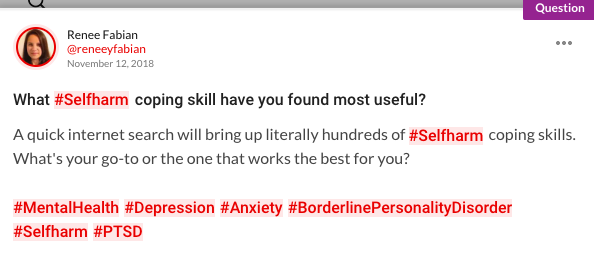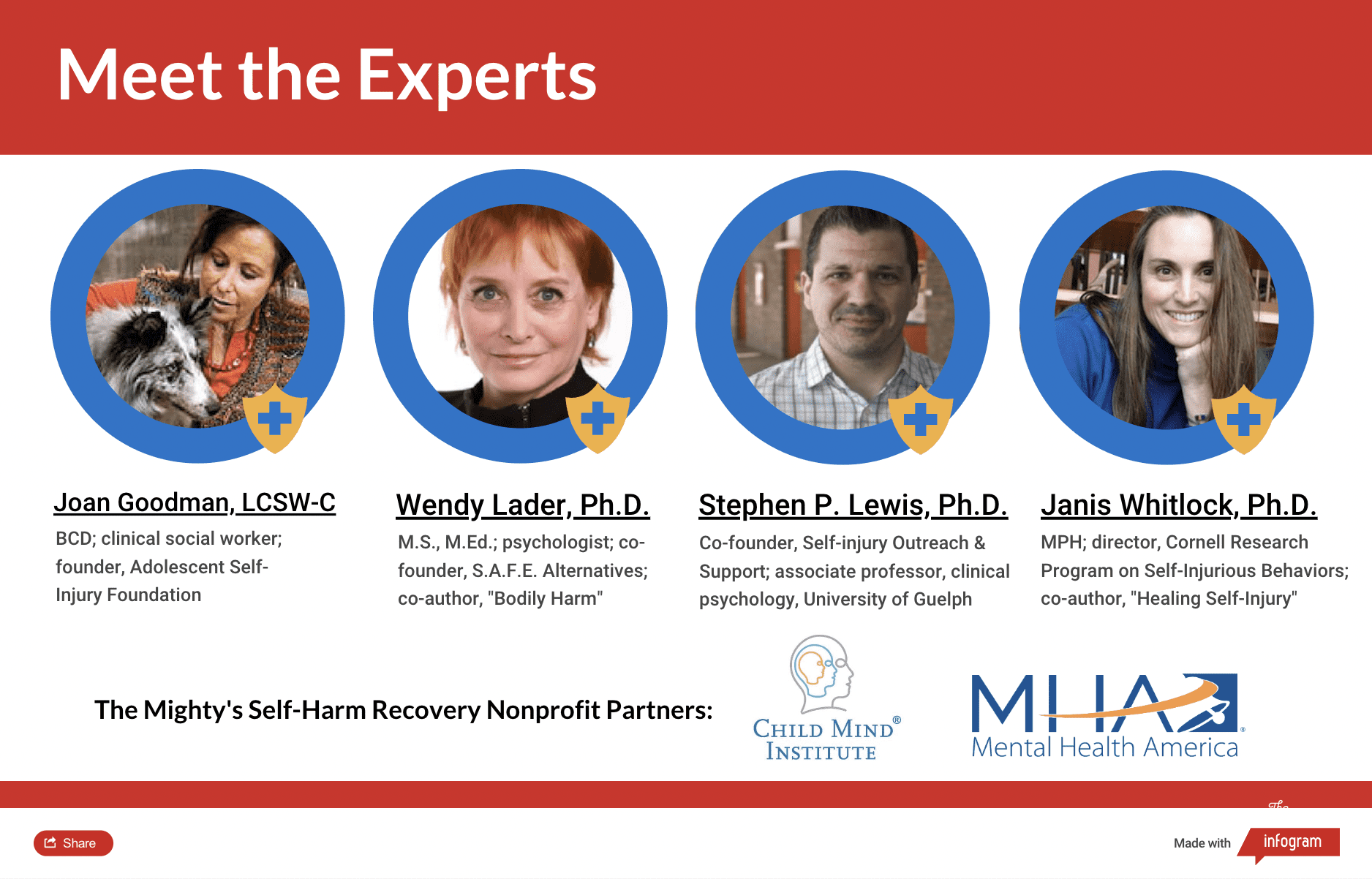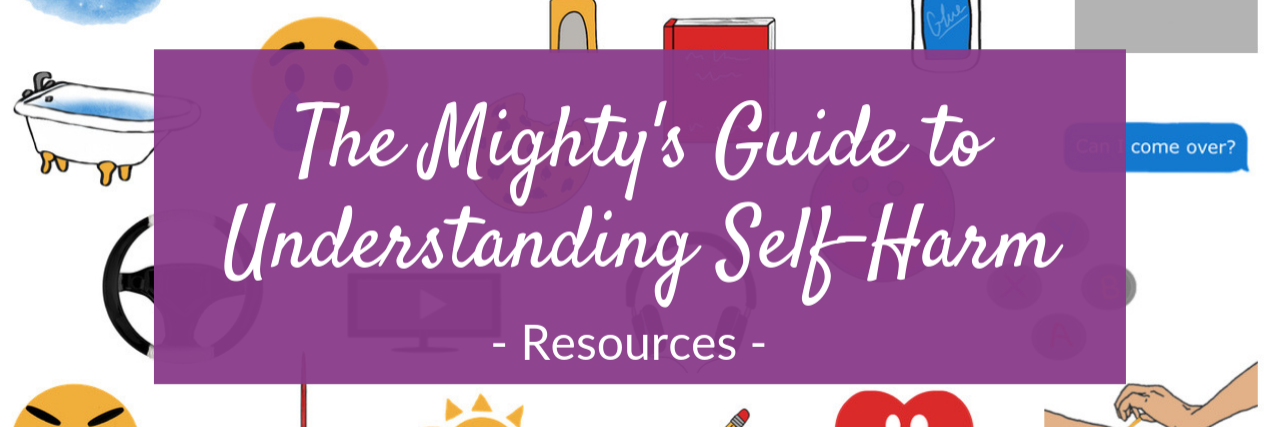Self-Harm Recovery Support Resources
Editor's Note
The Mighty’s Condition Guides combine the expertise of both the medical and patient community to help you and your loved ones on your health journeys. For the self-harm recovery guide, we interviewed four mental health experts, read numerous studies and surveyed 2,500 people with a history of self-harm. The guides are living documents and will be updated with new information as it becomes available.
How to Get Help for Self-Harm
In self-harm recovery, keep many resources on hand, from coping skills to connecting with others who get it or reminders recovery is possible. To give and get support, post on The Mighty or check out organizations like To Write Love on Her Arms or Self-Injury Outreach & Support. For need immediate help, call the National Suicide Prevention Lifeline at 1-800-273-8255.
Learn More About Self-Harm Recovery: Overview | For Young People | For Adults | For Parents and Loved Ones

Join the Self-Harm Recovery Community on The Mighty | Crisis Hotlines and Emergency Resources | National Organizations | International Organizations
Self-Harm Resources: Support for Recovering From Self-Harm
When you’re in recovery from self-harm, it’s useful to have many resources on hand, whether you’re looking for new coping skills, want to chat with others with similar experiences, need ideas on how to talk to a loved one or just want a reminder that recovery is possible. These national and international resources are safe communities with up-to-date resources about self-injury recovery. Plus, if you’re the caregiver of someone who self-harms, there is just as much info here for you too — and don’t forget your own self-care!
Join the Self-Harm Recovery Community on The Mighty
From relatable stories of recovery to the ability to connect with others who understand exactly what you’re going through, join The Mighty’s self-harm recovery community online. You can connect with The Mighty community via the website, app or Facebook page to read personal stories and learn about the latest on self-harm in the news. Don’t forget to post your Thoughts or Questions anytime on The Mighty’s website or app to get support and advice from others anytime you need it.
Self-Harm Recovery on The Mighty
On The Mighty’s self-harm recovery page, you’ll find a collection of personal stories, thoughts and questions from others who are in recovery from self-harm and other news and articles about self-harm. You’ll can discover new coping skill ideas, find out what worked for others in recovery and most importantly, learn you’re not alone.
 Join the conversation and answer this Mighty question here.
Join the conversation and answer this Mighty question here.
The Mighty’s Self-Harm Recovery Facebook Page
Take the conversation about self-harm recovery one step further by joining The Mighty’s self-harm recovery Facebook page. You’ll get a steady stream of great stories The Mighty’s mental health editors don’t want you to miss, plus another chance to engage with a community who gets what it means to recover from self-harm.

Crisis Hotlines and Emergency Resources
If you’re having thoughts of suicide or having a mental health crisis, reach out for support right away. Contact a loved one or your therapist, call 911 or reach out to one of the following crisis lines via phone or text.
If you are feeling suicidal, there is hope.
- You can call the National Suicide Prevention Lifeline 24/7 at 1-800-273-8255
- You can reach the Crisis Text Line 24/7 by texting “START” to 741-741
- You can call The Trevor Project, an LGBT crisis intervention and suicide prevention hotline, 24/7 at 1-866-488-7386
If you are hard of hearing, you can chat with a Lifeline counselor 24/7 by clicking the Chat button on this page, or you can contact the Lifeline via TTY by dialing 800-799-4889.
To speak to a crisis counselor in Spanish, call 1-888-628-9454.
Head here for a list of crisis centers around the world.
For additional resources, see the American Foundation for Suicide Prevention and SAVE (Suicide Awareness Voices of Education).
You can read the following stories from people who’ve been there:
- If You Feel Like You’re ‘Losing’ to Your Mental Illness, This Is Your Reason to Stay
- For When Your Only Thought Is Suicide
- The Difference Between Wanting to Die and Wanting the Pain to Stop
- Dear Suicidal You
And for additional messages of hope, click here.
You are not alone.
National Organizations
In North America, these organizations represent the who’s who of self-harm recovery. You can find everything from creative coping skills, therapist directories, the latest in self-injury research and even an empowering sweatshirt if that’s your thing. All of these sites are “trigger-free” and offer realistic, hopeful messages about recovery in addition to resources designed just for caregivers and parents.
To Write Love On Her Arms (TWLOHA), named after a story the organization’s founder brought to life to help a friend, isn’t just about self-injury. It also covers depression, addiction and suicide. Regardless, TWLOHA has some of the most empowering messaging out there and its nonprofit mission supports mental health treatment and recovery while raising awareness nationwide. Its mission is supported in part by a robust line of amazing merch, and it has a therapist referral directory.
Cornell Research Program on Self-Injury and Recovery
Cornell University’s Research Program on Self-Injury and Recovery (CRPSIR) delivers the latest research on self-injury in an easy-to-read format. The program’s info sheets cover self-injury statistics, how to talk to your loved ones about self-harm and coping skills based on your emotions. For parents, educators and professionals, CRPSIR also offers virtual training courses on self-harm and recovery. Its handouts and resources are especially helpful for parents and caregivers.
Self-Injury Outreach & Support
Self-Injury Outreach & Support (SiOS), a collaborative effort between the University of Guelph and McGill University in Canada, provides personal stories, coping skills and guidance on what you can do if a friend self-injures. SiOS’ coping and recovery guides break down what you can do step-by-step when you have a self-harm urge or to cope day-to-day. Everything the organization does is backed by research and it has a section dedicated specifically to schools.
Adolescent Self-Injury Foundation
Backed by more than three decades of clinical experience thanks to its founder, Joan Goodman, the Adolescent Self-Injury Foundation (ASIF) gathers resources from others in self-harm recovery. The site is easy to read, and you can find especially creative coping skills like the butterfly project, memory box and hug theory. There’s also guidance for talking to your loved ones and do’s and don’ts for parents.
S.A.F.E. Alternatives was founded in the late 1980s when self-injury was still a mystery to most mental health professionals. While its in-person programs have been scaled back in recent years, the site still offers several useful resources. This includes a therapist referral directory, a list of books on self-harm and recovery and other organizations that may be of interest to those in recovery from self-harm.

International Organizations
If you’re looking for resources worldwide, the following organizations offer support for self-harm recovery through their websites and beyond. These groups can direct you to additional resources and referrals as well as provide more self-harm recovery resources.
LifeSIGNS (U.K.)
A robust site with a blog, LifeSIGNS U.K. covers all the ins and out of self-harm recovery, including how to support a loved one who self-harms, considerations when showing your self-harm scars, coping skills and first aid. You’ll also find info on how to start your own in-person support group along with global links for additional mental health support.
Self-Injury Support (U.K.)
As its name suggests, Self-Injury Support connects you with U.K.-based support groups, direct support services and crisis resources. It provides training workshops for professionals and consultancy and reflective practice sessions. Self-Injury Support also offers plenty of information about the what and why of self-injury along with information tailored specifically to caregivers of those who self-harm.
Shedding Light on Self-Injury (Australia)
Whether you’re in recovery from self-harm, a teacher, parent or professional, Australia’s Shedding Light on Self-Injury has you covered. It’s a great source of referral links to relevant research, books, international organizations and places to learn more no matter what your relation to self-harm.
Learn More About Self-Harm Recovery: Overview | For Young People | For Adults | For Parents and Loved Ones



